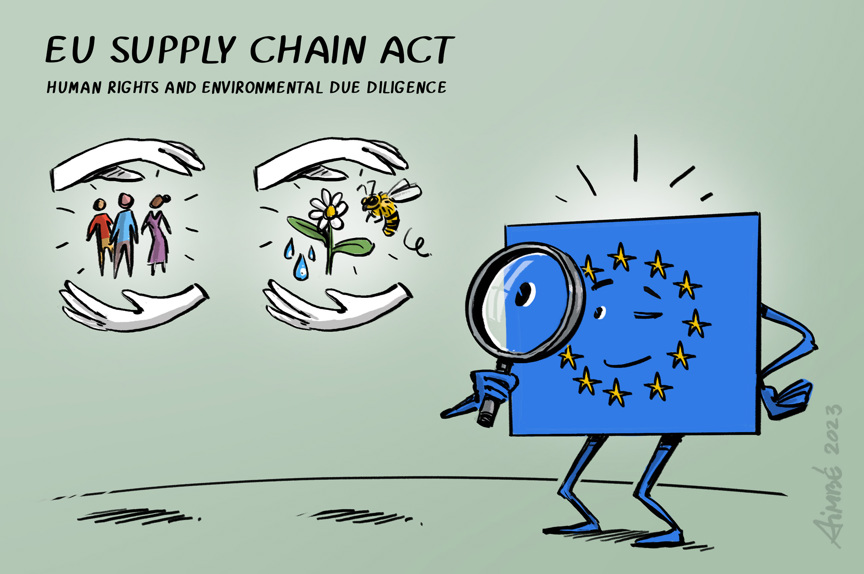- Sustainability , Corporate Law and M&A
- EU Supply Chain Act , CS3D , due diligence , human rights due diligence , environmental due diligence , prevention action plan , due diligence of value chains , full compensation for victims
Last year, the European Commission introduced a proposal known as the Directive on corporate sustainability due diligence (“the CS3D”also “The EU Supply Chain Act”).
In a previous article, we already discussed the national initiatives within the EU that are focused on developing due diligence frameworks alongside the EU-wide process of the CS3D.
In this article we will threat the current status of the CS3D and the anticipated timeline for its approval and implementation.

Since the introduction by the European Commission of the proposal known as the Directive on corporate sustainability due diligence (“the CS3D”also “The EU Supply Chain Act”), significant progress has been made on the topic of conducting human rights and environmental due diligence, both within specific jurisdictions and at the European Union (EU) level.
1. Current status and what we can expect from the EU Supply Chain Act (CS3D)?
The EU Supply Chain Act approval is expected by early 2024 and its implementation by early 2026. Germany has passed its supply chain due diligence bill in 2023, France in 2016, Belgium, Spain and the Netherlands have introduced law proposals on the topic too: the landscape is changing.
In any case, whether under the CS3D or independent national legislation; and be it due to direct application of these regulations or as part of the value chain of an undertaking subject to them, companies will most likely have to comply with environmental and human rights due diligence obligations sooner rather than later.
2. What will companies have to do to be compliant?
The CS3D will establish guidelines for companies to address and minimise the environmental impact and human rights abuses resulting from their operations.
Companies will be obligated to conduct due diligence not only within their own activities but also across their subsidiaries and other business partners.
Companies will have to develop and implement "prevention action plans" and obtain contractual commitments from their business partners to adhere to these plans. Furthermore, companies will be legally responsible for verifying compliance with the agreed-upon measures.
Apart from what is felt like a lot of paper and bureaucracy, this also means financially investing in suppliers “down stream” to support them in becoming compliant with international standards. Impacts are thus really far reaching.
3. Which companies will the CS3D apply to?
The CS3D will apply directly to all EU and non-EU “large companies” that are selling goods and services on the EU market. These are companies larger than 500 employees, or with a turnover superior to 40 million euros.
However, any SME that is part of the supply chain of a large company will have to apply the regulation and be compliant with all human rights and environmental standards, as the large companies upstream will ask the SMEs to provide them with all proof of their own supply chain due diligence.
4. What will companies risk?
As of today, the CS3D aims at full compensation for victims of human rights and/or environmental adverse impacts when the following four conditions are met:
a. damage is caused to a natural or legal person;
b. there has been a breach of due diligence obligations;
c. there is a causal link between (i) and (ii); and
d. there is fault (intention or negligence).
5. Which international standards are covered?
The scope is still to be definitive, but among others, these international standards will be covered:
- United Nations Guiding Principles on Business and Human Rights
- OECD Guidance on Responsible Business Conduct and sectoral guidance
- International Labour Organisation (ILO) Tripartite Declaration of Principles concerning Multinational Enterprises and Social Policy
- United Nations’ Sustainable Development Goals
- Paris Agreement under the United Nations Framework Convention on Climate Change adopted on 12 December 2015
- Glasgow Climate Pact
- The EU Commission’s 2030 Climate Target Plan
Keep in mind that the food and agriculture industry is also undergoing similar structural changes. This sector is already heavily impacted by recent EU legislation that outlaws a list of unfair trading practices in the agricultural and food supply chain, including late payments, short notice cancellation and unilateral contract changes by the buyer.
6. Conclusion
The task will be immense and daunting, but also constitutes an amazing opportunity to shift the course of trading practices.
Making your company compliant means setting your business up for success and secure, long-lasting business relationships.
Particular attention should be paid to the timing of enactment. Although it is only scheduled for 2026, given the magnitude of the task of being compliant, it will be best to pay full attention to these future rules as early as tomorrow.
If you have any questions on this subject, please do not hesitate to contact our specialists: +32 (0)2 747 40 07 or info@seeds.law.
Read alsoThe EU Supply Chain Act (Part 1)




